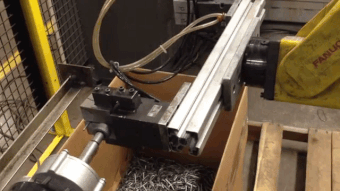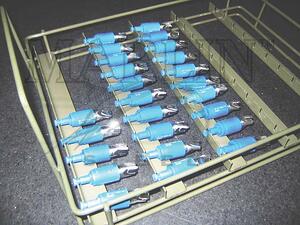 There are many different materials that can be used for wire forming projects—and the best materials to use will be different in each case depending on the end use of each wire form. Even two nearly-identical designs might have to be made from different materials if they’re used in different conditions.
There are many different materials that can be used for wire forming projects—and the best materials to use will be different in each case depending on the end use of each wire form. Even two nearly-identical designs might have to be made from different materials if they’re used in different conditions.
With this in mind, here’s a short list of some of the best materials to use for wire forming projects:
1: Grade 304 Stainless Steel
As an austenitic stainless steel alloy, grade 304 SS boasts an incredibly high resistance to corrosion. With a tensile strength of 621 MPa (90 ksi), this metal is stronger than either Grade 316 or Grade 317 SS—making it ideal for use in environments with mild corrosives and for handling heavier loads.
In most use environments, Grade 304 stainless can resist oxidation better than plain steel or iron. This helps any wire form made from 304 SS last longer without the need for replacement.
In high-temperature applications, Grade 304 SS is suited for use in processes up to 870°C (1,679°F). At temperatures of 1,399°C (2,550°F) or higher, the alloy will begin to melt. So, while the material can more than take most oven-like conditions, it isn’t really rated for the toughest heat treat applications like Inconel® would be.
2: Grade 316 Stainless Steel
Another austenitic stainless steel, Grade 316 SS is even more resistant to corrosion than 304 SS is. In particular, 316 stainless steel is better at resisting chlorides (like salt) and is often used in cookware and naval applications because of this fact.
The tensile strength of 316 SS is a little lower than 304’s, weighing in at 579 MPa (84 ksi). Not a major difference, but it can be important for applications with heavier-weight loads.
The maximum use temp of this alloy tops out at around 800°C (1472°F)—less than the use temp recommended for 304 steel.
Ultimately, Grade 316 SS is most useful for applications where 304 SS would normally be used, but the use conditions are too caustic or involve chlorides.
3: Grade 434 Stainless Steel
A ferritic alloy of stainless steel, Grade 434 SS is noted for having an exceptional resistance to pitting. Because 434 SS doesn’t have any nickel content, it is often less expensive than the austenitic stainless steels.
The highest recommended use temperature of 434 SS is 815°C (1499°F), making it well-suited to the average high-temperature process, but still not ideal for heat treat applications.
Although less chemically resistant than Grade 304 stainless, Grade 434 is still better at resisting oxidation, corrosion, and pitting than plain steel is. This makes 434 a good general-purpose choice for making steel wire products—and at a lower cost than 304.
4: Polyester TGIC Powder Coat
 Many wire forming projects use a specialized coating of a secondary material to protect the actual wire form from exposure to harsh chemicals and high temperatures—helping prolong the useful life of the wire form.
Many wire forming projects use a specialized coating of a secondary material to protect the actual wire form from exposure to harsh chemicals and high temperatures—helping prolong the useful life of the wire form.
One popular coating option is polyester TGIC (triglycidyl isocyanurate) powder coat. This coating boasts a relatively high “pencil hardness” of 2H-3H and resists getting marred or chipped by abrasion. It also resists salt spray better than Urethane powder coat, making it better for applications where chlorides are an issue.
However, the low melting point of polyester TGIC (300°F) prohibits its use in any high-temperature application. This is a common weakness of most polymer materials.
5: Niloxy High Solid Coat
Another coating material with an even higher pencil hardness (3H-5H) than polyester TGIC. Niloxy solid coatings strongly resist marring, staining, chipping, humidity, and many solvents to provide excellent protection for metal wire forms.
However, this particular coating has a poor resistance to ultraviolet (UV) light, so it should not be used in any outdoor applications.
6: Plastisol (PVC) Coat
Plastisol is a flexible coating material with properties that can vary based on what plasticizer and processes are used to apply it.
For example, a plastisol coating applied using the fluidized bed process goes on very thinly, which can be useful for fine wire mesh forms that only need protection from chemical exposure. On the other hand, dipping processes create a thick, semisoft layer of material that excels at cushioning impacts and keeping held parts from getting scratched.
7: Inconel®
Inconel® is the brand name of a specially-formulated series of alloys that are specifically made to withstand intense temperatures. Of all the materials listed in this article, Inconel® has the absolute highest recommended use temperature at 1,093.3°C (2,000°F).
At room temperature, Inconel® 625 has an ultimate tensile strength of 956.9 MPa (138.8 ksi). At a temperature of 2,000°F, this drops to 91.7 MPa (13.3 ksi). Although a significant drop, this is still enough for the metal to hold its shape and still carry lightweight parts—which is more than most metals can do at that temperature!
Inconel® is often highly recommended for extremely high-temperature heat treat applications, but it is also very costly to acquire and machine into shape for a wire form.
8: Grade 330 Stainless Steel
Grade 330 SS is another alloy specifically formulated for use in high-temperature applications. With its high chromium and nickel content, Grade 330 stainless can withstand prolonged exposure to temperatures of up to 1,037°C (1,900°F).
This makes it slightly less robust than Inconel® 625. However, it is also less costly to acquire and machine, so it is often recommended as an alternative to the name-brand material.
These are just a few of the different materials that can be used to make (or coat) a wire form. The best one for your particular wire forming project depends on just what you plan on using it for, and the chemicals, temperatures, and processes involved.
To learn more about which materials are the best for your next wire forming task, contact Marlin Steel or see an overview of stainless steel grades in our Steel Properties Sheet.



.gif)


